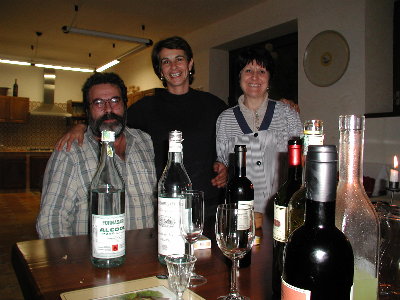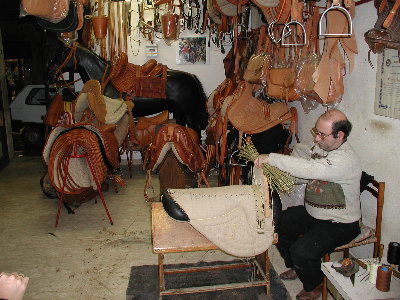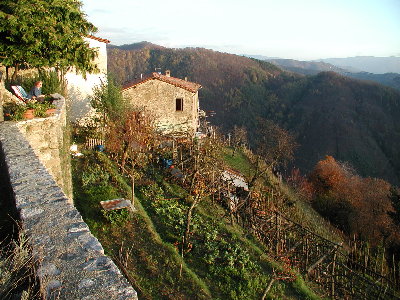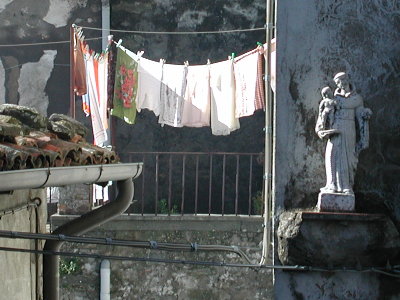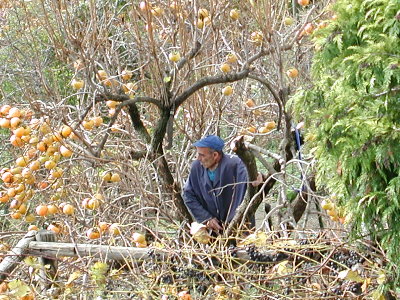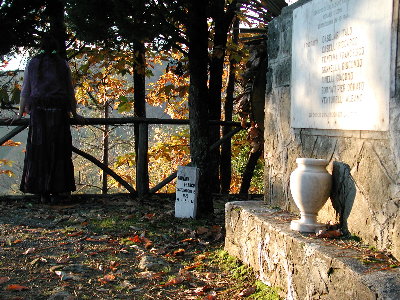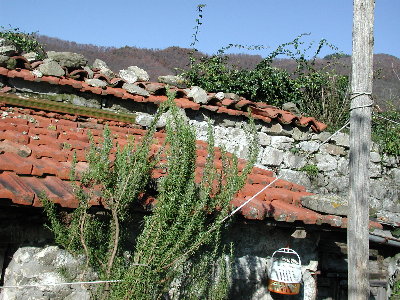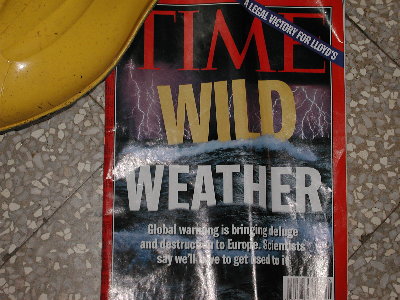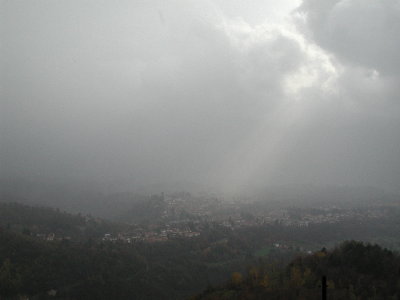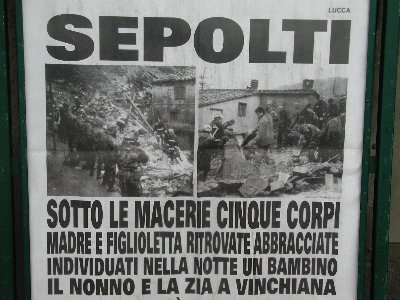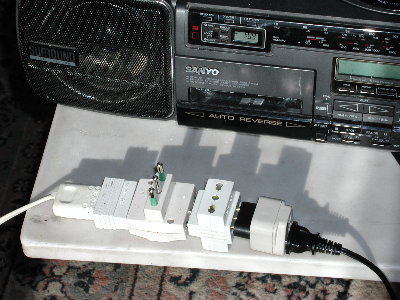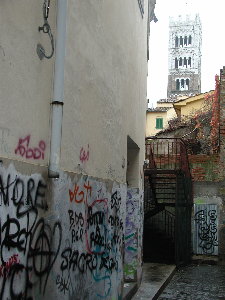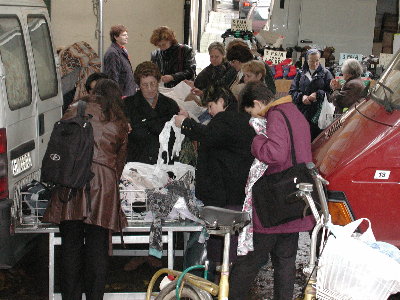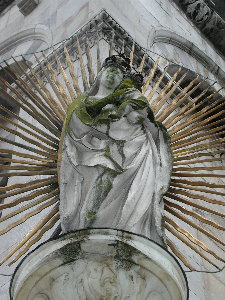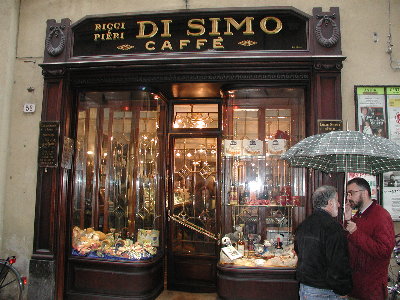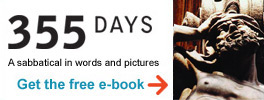Much has changed since we were here in 1994 and 1996. And a lot hasn’t. Here are some observations and random travel notes.
Both the French and Italians seem increasingly willing to exercise their English. Often, it’s hospitality staff who sense that their bad English is more efficient than your bad Italian. But sometimes it’s older folks eager to practice—and tell you about their visit to Chicago. We’re still surprised at how many youngsters with years of English studies can’t handle a “How are you?” But that’s OK; it makes us try our Italian.
English keeps penetrating, getting cooler. TV shows or segments have names like “Pure Morning” and “Help,” while phrases like “guitar god” and “top model” are common. We’re always most moved by the gibberish on clothing, though, like this motorcycle jacket: “Rare People Only. Bomb Boogie Bomb. Permanent Expression for Rare Jackets. For Exclusive and Personal Flights. One and Only Company.
Most European nations haven’t tasted the melting pot like the U.S. has. But advertising (and other) imagery no longer features only beautiful, quintessential Italians. In fact, most ads depict far more skin tone variety than the typical town or piazza.
When we first walked into our favorite bar in Barga, an older gentleman was serenading the gang with an operatic aria. Some were enraptured, some were bored. But such still remains routine here, and singing echoes through the streets at any hour. Popular music seems to have improved; Italian rappers have arrived; jazz is hot; and American hits still lead the parade. But they’ve finally quit playing that Cher song that just wouldn’t go away
“Telefoninos” are everywhere, and most feature a loud, long signature ring—or make that a shrill excerpt from some musical piece. No one appears to feel any limitations about using them anywhere and thus sharing their lives. The only limitation evident, in fact, is that the talker must now facilitate gestures with one hand
Not much changes in the way that business (big or not) is transacted (or not). A fine wine we wanted went up in price twice while we shopped—once when the son sensed our interest and again when his mother rang up the sale. A restaurant owner maintains a full bar without license, but fears no bust since he knows the licensor. Real estate may be sold either through agents that charge hefty fees and mark up properties—or directly from the seller and likely involving suitcases of cash.
Toilet humor aside, there’s noteworthy progress in this arena. The biffies are generally spiffier, which is great news for hygiene-happy Americans. There’s also a growing preponderance of automatic flushers, sinks, and towel dispensers (though they rarely work right). Don’t leave home without toilet paper, though. And ask permission before visiting the loo, or at least announce your intentions, which is more essential the smaller the establishment and the more filthy the toilet is likely to be.
These days the Italian kids are more conscious of their personas. Many were sporting hair gels, piercings, tattoos, dreadlocks, and such—especially young men. But compared to our homeboys, their demeanor was demure and tidy. Baggy pants and backwards caps were not to be found. As for the ladies, they’re are dying their hair (particularly in shades of red) and wearing elevator shoes. But a tasteful, understated style still rules the streets
- Exporting the Wealth Effect.
The U.S. economy has been kind to Americans for years now, and thus consumerism has become the growth engine and national pastime. But we’re not alone. Shopping is popular here too. Big cars and even SUVs are clogging skinny streets. And you may have to book days ahead for a table in a tony restaurant—and that’s during the off-season
- BYO Sunscreen & Sunglasses.
In the U.S., restaurants and bars tend toward the dark, or at least subtle, lighting. Not so here. Going out means someone else is paying the electricity (which is expensive) so people want it real bright. When guests arrive, proprietors may turn up the lights and smile and point proudly. Preferring dimness, we occasionally found ourselves in request battles over lighting levels with other guests. We always lost, even if the manager agreed with us
We must confess: We’re from Minnesota, the land of 10,000 anti-smoking laws. Smiling smokers may find us unenthused, though we know to keep quiet. But Italy seems to be clearing the air. We saw smokers outside office buildings. Others stepped away or to an open window. One restaurant (admittedly a pricey one) even had smoke-eaters in the ceiling. There are still plenty of people eager to share nonstop second-hand smoke with you, and places where clean air never existed. But smoking may be becoming a privilege, not a right
Perhaps the most obvious change in Italy is their new taste for beer. It’s cool to shun wine and swill brew—never mind that it may cost five times as much. Taps are proliferating, although holding a bottle is more chic. But whatever you do, think twice about drinking an Italian beer. Go for Beck’s or Bud or something from Bavaria.
In the past, spotting a French or Californian wine was more rare than spotting a French Californian tourist. Now, you may find wines from both places—and a few others. We can’t help but notice that the California wines offered with panache and high price point here might be pedestrian in the U.S. But of course, they could probably say the same about the Italian stuff we sip at home.
- The Waiter Is Always Right.
We know the drill, we’ve spent much time here. But we’re still rattled by the way waiters want your order before you’ve even read the menu, they want all possible courses at once, and they rarely remember who ordered what. As for “when-in-Rome” rules, if you like your coffee with your dessert (like most Americans), fuggetaboutit; your waiter knows better.




